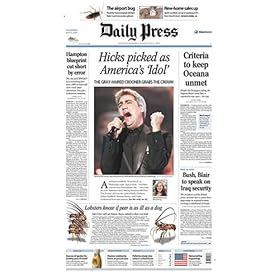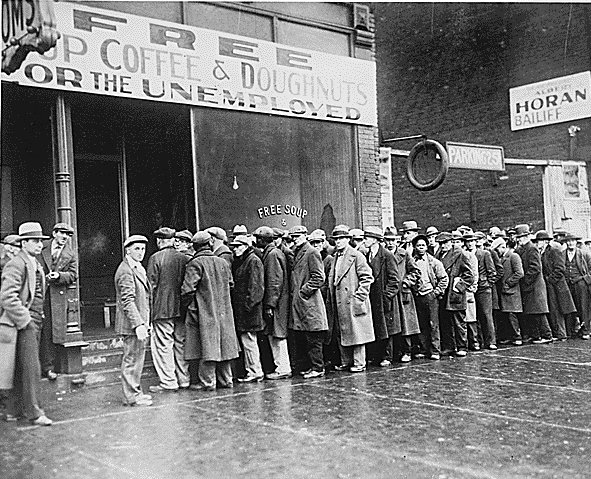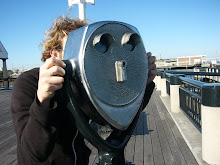 nice area, with some room to grow and explore, and with absolutely no desire to take the job.
nice area, with some room to grow and explore, and with absolutely no desire to take the job.The job was undeniably a step up the ladder I put in front of myself way back in high school, when I first felt the hot bite of the newspaper bug and immersed myself in the mystique of the newsroom, the clack of the keyboard bouncing off the walls, phones slammed down with harried aggression by bedraggled reporters, my own phone ringing at a late hour with an irate editor at the other end, demanding more information, more questioning, bellowing on about standards and printability; then the satisfying smack of the paper on the front porch the next morning with my name in small print across the front page topped by some dramatic headline, the ego always kept in check by the quick yellowing decay of day-old newsprint, the knowledge that each day's achievements are only as good as the next day's deadlines.
I loved it. Still do. The problem is, it doesn't exist any more. Or maybe it does still exist only in
 the hearts of the dedicated printies, those with ink and fire in their veins, the people whose idealism is being strangled to death every day by the latest budget cutbacks, staff shortages, shrinking news hole and general top-down malaise infecting the newspaper industry that makes a newsroom about as cheery a place to work as a factory that produces greeting cards for dead pets. Those people are still out there, the ones with good ideas, the energy, the talented enthusiasm and dedication to a higher purpose and an understanding of the damned importance of the journalism newspapers provide that should have drawn us all to this profession in the first place. Honest truth is: we are being shunned away from the industry in droves by an overarching mindset stuck in the old model of journalism, when newspapers were fat with advertising wealth and market dominance, and technology was seen as an annoyance rather than a tool. At too many papers, it was too common for everyone to enjoy their privileged perch atop the world of information purveyance, never stopping to see the ripples of evolution rocking the foundation. (The music industry went through the same thing, fyi. So don't say we couldn't see it coming.)
the hearts of the dedicated printies, those with ink and fire in their veins, the people whose idealism is being strangled to death every day by the latest budget cutbacks, staff shortages, shrinking news hole and general top-down malaise infecting the newspaper industry that makes a newsroom about as cheery a place to work as a factory that produces greeting cards for dead pets. Those people are still out there, the ones with good ideas, the energy, the talented enthusiasm and dedication to a higher purpose and an understanding of the damned importance of the journalism newspapers provide that should have drawn us all to this profession in the first place. Honest truth is: we are being shunned away from the industry in droves by an overarching mindset stuck in the old model of journalism, when newspapers were fat with advertising wealth and market dominance, and technology was seen as an annoyance rather than a tool. At too many papers, it was too common for everyone to enjoy their privileged perch atop the world of information purveyance, never stopping to see the ripples of evolution rocking the foundation. (The music industry went through the same thing, fyi. So don't say we couldn't see it coming.)With salary freezes, job cuts, shrinking circulation and a future strategy that is focused on paying off creditors instead of trying to regain ground, what incentive is there for us to stay?
I sat in that interview in Virginia and asked the editors point blank "What are your ideas to turn this thing around?" and "What is the plan??" only to have them look back at me, shift papers on their desk and say things to the effect of, Well, , uh, we need to hold on to the readers that we have, we need to keep providing the top-quality product we've always produced, we need to redesign to attract younger readers, we're experimenting with web video, and so on with the same thing I've heard echoed from coast to coast, A section to the classifieds.
I kept after the line of questioning, not something I was doing to impress my interviewers with tenacity. It was the only action I could harness to repress my inner voice wanting to scream: "That's not enough."
And it isn't. The strategy for newspapers to save themselves at this point, according to every person I've heard from at my paper and others, from low editors to top executives, from three years ago to just last week, is the following:
1) Offer readers shorter stories
2) Offer readers fewer of those stories
3) Hire less staff to cover a smaller area
4) Provide your staff with a smaller pool of resources with which to do their jobs
5) Charge more for the product
6) Add superfluous video to newspaper Web sites
7) Wait with open arms for readers to return
I'm not a business person, but that strategy seems redonkulous to me, and I have yet to see any evidence to disabuse me of that notion. I'm not in the position to say I have all the answers (though several people have proposed many good ideas that deserve review), but at our paper alone, the fact that every day we walk through the door isn't a Defcon 2 lockdown all-hands-on-deck affair trying to figure out how to turn this ship around is baffling to me. How long do you let yourself keep getting smacked by cannonballs until you stop worrying about bailing out the water and start returning fire, or, at least, turning in the other direction?
The editor from Virginia called me back a week later. How would I feel about taking on an crucial beat out in Suffolk? We need someone who can dig into things, she said, and you'd be a perfect fit.
I thought about it and talked to her again. I just can't do it, I said, the echo of the response surprising even a part of myself still. I need to find something else. Newspapers are clearly not the answer. Not the way they've been handled, not the way they're set up now, not with the stubborn impediments to progress that are frustrating our generation with no end in sight.
And that was it. That phone call was essentially my break up with the newspaper industry (at least for the short term). And that bitch still had my CDs.
So then the big decision lumbered back into the picture: what the hell else are you supposed to do when the only industry you've ever had interest in no longer is viable? I bounced around several ideas that included the obligatory trip-to-Europe-to-find-myself-or-at-least-someone-who-looks-like-me, or moving to the ATL to live with Cribbs and Pouya and turn freelance tricks for any john publication willing to pay. Neither seemed to click as the immediate answer.
I knew I couldn't stay here, on Hilton Head, this quiet rock I've lived on for damn near four years, where I've gathered an intricate collection of life experiences, heartbreak and help, but where the tank on challenges and excitement has long since run dry.
After a period of heavy thinking, er, heavy drinking ... that is to say, heavy thinking while also drinking ... and consultation with friends, my spinning Twister blade stopped and I realized uncertain times call for uncertain measures.
New York City.
The plunge into the center of it all, the beating heart of the beast, in search of something different on lost city streets or in the shadow of shiny skyscrapers, where the great sum of creative forces amass before trickling down to all the rest. The goal is Brooklyn, an interesting place with interesting people, where lots of friends and associates have already landed and made a successful go of it since college.
The action came hot and fast after that. I told the Packet I was quitting effective Nov. 4, the latest in a stream of resignations, and that they had best get a replacement ready. I called my mom and told her the plan, and she reacted with a sort of verbal shrug of the shoulders, a surprised complacency. You always seem to land on your feet, she said. I sighed with relief back at her and silently hoped she was right.
I spread the word at work and started reaching out to any and all contacts in the city. My boss's
 first thoughts were to give me the name of a good soup kitchen. True story: St. Anna's near Rockefeller Center, he said.
first thoughts were to give me the name of a good soup kitchen. True story: St. Anna's near Rockefeller Center, he said."Do you know this from experience, Fitz?"
"Well ... no, no. I just know the guy..."
Sure you do. (Note: I just Googled this and am not sure if it is a real place or not.)
The nerve-wracking part is that I have no job leads, no housing arrangements and pitifully (I do mean pitifully) little money saved up, even less so maybe after this weekend when I stepped on this dude's over-priced Quicksilver sunglasses and may have to buy him a new pair.
All I've got right now is the pledge of a few couches to sleep on, a familiarity with the regular content of Brooklyn Vegan, some friends who are making a living in some writing related fields in the city and a tall pile of clips that I've got no choice but to put full faith in at this point. Surprisingly, no one has advised me that this idea is a bad one, or even warned against incautious career evacuation. A handful of my editors were even visibly exuberant at the thought, saying things like, "I wish I could do that too," and, "What a great idea." Mostly I'm sure this is meant to either console my soon to be homeless sorrow, or to reflect their joy at being able to hire a newer reporter at lower pay rate.
Part of me always knew I'd end up in the city at one point or another (I also have the same assumptions about California, where I was heartily applying for jobs up through this summer),
 possibly a byproduct of growing up in Jersey, the gleaming heights and roar of the subway train just a school field trip's journey away at all times, the excitement always bleeding over state lines and down to our suburban enclaves. I was in the habit for awhile of telling all creative types I met that I'd see them again when we crossed paths in the city, the terminus everyone must pass through.
possibly a byproduct of growing up in Jersey, the gleaming heights and roar of the subway train just a school field trip's journey away at all times, the excitement always bleeding over state lines and down to our suburban enclaves. I was in the habit for awhile of telling all creative types I met that I'd see them again when we crossed paths in the city, the terminus everyone must pass through.About Nov. 10 or so, I'll pack up my tiny red Saturn, having sold most of my large belongings to the new reporter taking over my bedroom in the apartment, point the car north and plunge into the great unknown, the wild tumult of houselessness and funemployment (the new buzz euphemism) and all the excitement that is being an wandering journalist full of pent-up writing vigor, searching desperately for an outlet.
Cut to Paul Mitchell's house days later, my birthday actually, when his parents weren't home and we climbed a ladder up onto the roof of his dock house, ignoring the warnings of instability broadcast by the tequila warming inside our stomachs, us gripping tightly on to the ridges of the slightly sloping roof that was thankfully, maybe presciently, made of a sturdy, non-slip material.
It was Hsieh and I up there this time, and, as we crouched on the roof facing over the black expanse of Broad Creek, we decided to jump in toast to our different adventures on the 15-foot drop. I rocked on my heels and threw myself off the perch feet first, opening my lungs to a mad scream
 of "BROOKLYN!" stretching out to the vast patch of marshland in the distance, with Hsieh a second behind chasing after his echo of a hurried "ALASKA!", both screams tearing through the silence that buffeted the still creek-front houses. We hit the water with a quick splash and I sunk deep into all the salty memories of the last four years, the edges lined with waving marsh grass and the top crowned in Spanish moss dripping in to give everything that sleepy, dream-like quality.
of "BROOKLYN!" stretching out to the vast patch of marshland in the distance, with Hsieh a second behind chasing after his echo of a hurried "ALASKA!", both screams tearing through the silence that buffeted the still creek-front houses. We hit the water with a quick splash and I sunk deep into all the salty memories of the last four years, the edges lined with waving marsh grass and the top crowned in Spanish moss dripping in to give everything that sleepy, dream-like quality.I swam to the dock to hoist myself out of the brackish creek, its waters still not hinting at fall even in the bottom of a September night.
It's these things about Hilton Head I'll miss the most. But my time here has come to an end.
[photo credits, bottom up: 1) Jay Karr, 9/30/08; 2) personal collection, 11/07; 3) Social Security Administration; 4) masternewmedia.org; 5) ecx.images-amazon.com]




6 comments:
My, oh my. I do believe you are doing the right thing. But when I read this sentence, my heart briefly dipped into my stomach:
"So then the big decision lumbered back into the picture: what the hell else are you supposed to do when the only industry you've ever had interest in no longer is viable?"
You were always the one who I could count on to hold out hope that there was some way newspapers would find a way to function properly again. It has only been 11 months since I left the newspaper industry, and I'm reminded of its growing naivety every month when I pay my student loan. If only my adviser had warned me that my Bachelor's Degree in Journalism with a specialty in print and a master's to match would expire in 10 years.
I can break my heart and send a swarm of evil butterflies into my stomach just thinking about how much newspapers have changed since that day I consulted with you and Pappy in the Packet break room ... wondering whether I should take the job.
But, my friend, you will land on your feet. You are more than an outstanding reporter. You also have an incredible talent when it comes to stringing together thoughts, ideas and descriptions. Your writing and other virtues will no doubt take you far. I'm just glad that for two years, I was lucky enough to have crossed paths with you.
I wish you all the best in this endeavor. It's the right thing to do.
I'm telling you Tim ... Queens is the new Brooklyn.
I'm coming to live with you, brother after I graduate in a year and a half/2 years. I can't think of a better place to go and get a job completely unrelated to my psychology degree than NYC.
I can't imagine anything written that echoed my own thoughts on newspapers so clearly. No matter what you do - there will always be ink in your blood, and I think that's how all of former newsroom-occupants will always be. (Considering there are two in my house currently, I think that's a solid scientific survey).
It may not be Brooklyn, but we always have a spare bedroom for you to crash in in Pittsburgh (and two comfortable couches also).
Good luck - there will be great things for you in the future.
Ginny,
Weren't you supposed to call me when you came to Atlanta?
Good luck to you - and give a shout if you ever wander out to the desert.
Post a Comment